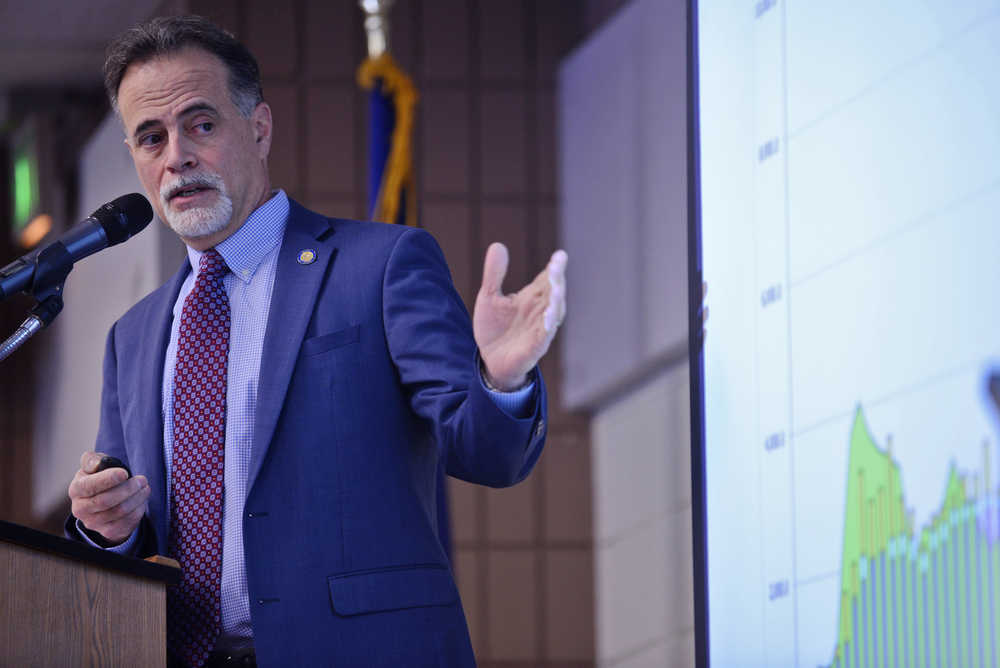When the new Alaska Legislature meets on Jan. 17, 2017, Sen. Peter Micciche (R-Soldotna) will take his first party leadership role as the Senate Majority Leader, Representative Mike Chenault (R-Nikiski) will step down as House Speaker to become the House Minority Whip, and freshman legislator Representative-Elect Gary Knopp (R-Kenai) will settle into his first term in Juneau.
The three spoke to members of the Kenai and Soldotna Chambers of Commerce on Tuesday about the upcoming legislative session. Micciche concentrated on the biggest unresolved issue of the last session: Alaska’s roughly $3 billion deficit budget.
“If you cut all the remaining departments and all of the employees, you still wouldn’t make budget right now,” Micciche said.
Though he highlighted savings measures made in the past sessions, such as a $200 million savings in the Department of Health and Social Services, the state’s second most costly d
epartment after the Department of Education, he also pointed out that “we will run out of money in the next year or so if we don’t take the necessary steps to make the difference.”
It’s a case Micciche has made before — going into the past legislative session, the budget problem was similar — but one he said “doesn’t seem to be getting out.” As he did last year, Micciche highlighted an array of new revenue possibilities, including bonds, Permanent Fund earning restructuring, modified oil taxes and non-oil taxes.
“When I talk about the types, don’t misunderstand that as me raising my hand,” he said. “…Our priorities are still going to be continued budgetary restraint, strategic use of our legacy assets, changes to oil and gas tax credits — which we marginally accomplished — taxes impacting individual Alaskans, and future economic diversification with a return to the general fund.”
On the House side, both Knopp and Chenault said they expect the new Democratic majority to prioritize another unresolved debate from last session, the “marginally accomplished changes” to the state’s system of tax credits for oil producers.
Though Knopp, a former oilfield worker, said he’s reading up on the tax credit system and hadn’t settled on a firm
position, he gave a general idea of the outcome he’d prefer: a set of stable incentives that emphasize production rather than speculative exploration.
“Even when we incentivize oil and gas tax exploration, if we don’t get production in the line there’s no return on those dollars,” Knopp said. “So I’d like to see those incentives remain — after they’re in production and we’re receiving taxes and royalties on the production. Then we can reimburse those expenses. But if they’re dry holes, we can’t sustain them.”
Chenault said one of his concerns will be the uncertain future of the Alaska LNG Project under the state’s sole leadership. Since the three oil and gas companies that previously planned to partner with the state — ExxonMobil, BP and ConocoPhillips — have backed off the project, Chenault said the Legislature has been underinformed about the efforts of Gov. Bill Walker’s administration and the Alaska Gasline Development Corporation to continue the planned pipeline.
“Information I’d like to hear is, ‘What came out of these meetings in Japan?” Chenault said, referring to Walker’s meetings seeking project investment from Asian buyers. “What’s come out of these meetings in Korea? What information is there that you feel we can continue to move forward with this project?”
He criticized proposals from Walker and AGDC president Keith Meyer to seek project investment from prospective LNG buyers rather than producers.
Regarding the AK LNG Project, Knopp said he favored examining the governor’s proposals for a tax-exempt state-led project, as well as the possibility of an LNG pipeline serving in-state needs rather than export purposes.
Legislative roles
Chenault served a record of four two-year terms as Speaker of the Republican House Majority, but his unopposed reelection this year brought him into the 40-member House as part of a 17-member minority under a Democrat-lead majority caucus. He will serve as a Minority Whip.
“I’m kind of liking the idea of not being the Speaker for a change,” he said. “Maybe I can do some things I’d like to see done, versus what the majority would like to see done, or trying to counter anything the minority might like to see done… If any of you think I’ll go crawl in a hole that’s not going to happen.”
Chenault said his “workload will be considerably smaller than what it has been in the past,” with three committee seats: Fisheries, Rules, and the Committee on Committees.
The Republican Knopp said he’d made plans to enter his first session in the House as a majority member, but said the new minority is “strong.”
“I went up there with a list of five committee assignments I was trying to seek,” Knopp said. “I didn’t get number one, but I did get number two and three, so I’m extremely happy about that. I’ve been assigned Labor and Commerce and State Affairs Committees. Then in the special committees, I’ve got Economic Development, Tourism, and Arctic policy.”
On the Senate side, Micciche said he’s cutting back on his committee obligations in order to focus on his new Senate leadership position. After serving on nine committees last session, he’ll be retaining his seat on the Finance Committee and sitting on the committees for Rules, Health and Social Services, World Trade, the Legislative Council, and the committee on committees.
“My top priority is concentrating on a fiscal solution for the long term, and I’ll be busier driving the majority toward that objective this year, which will allow me less time on the other committees,” Micciche said. “The most important thing is that I remain on finance, and the peninsula is well-represented on a committee that sees essentially every bill that comes through the legislature.”
Reach Ben Boettger at ben.boettger@peninsulaclarion.com.

